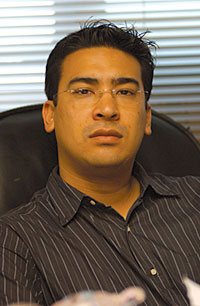Saurabh Jyoti, Chairman of The Nepal Automobile Dealer's Association and director of Syakar Company, talks to Nepali Times about the automobile market scenario, ahead of the NADA Auto Show next week.
Nepali Times: After the downturn earlier this year, are automobile sales picking up again? 
Saurabh Jyoti: The market is in recession and is at the lowest it has been in perhaps a decade. Car sales have drastically dipped by 30 per cent. The pre-Dasain excitement is yet to pick up.
What are the main reasons for this slowdown?
The foremost reason is negligence on the part of the government towards the auto industry. Road transportation is the engine of this country's growth, it is the only option. Yet, the tax rates for vehicles in this country are among the highest in the world. Car dealers need to pay the road tax even before they sell the vehicle. But we see scant proof that all these taxes are being re-invested in infrastructure. In fact the opposite the true, the existing roads are falling apart. Secondly, the availability of auto loans has become difficult, with interest rates going as high as 18 per cent. The high price and lack of finance have made consumers cautious and skeptical.
So what role is NADA playing to jumpstart sales?
NADA has been working with government officials on the new transport policy and emission law. We have been pushing for 15 per cent reduction in the excise duty. People say that there are already too many cars on the road, but the problem is that the contribution of these vehicles to the national revenue is not being invested to expand and maintain the road network.
Now that we see the prime minister riding a Nepal-assembled vehicle, are we ready to move from solely retail to a manufacturing auto market as well?
An auto plant requires huge investment. If the government provides a conducive and secure environment, then people will be willing to put in their money. More immediately, the sales volume of motorcycles we have can justify opening a local assembly plant.
Read also:
Joyride
The Prime Minister has set an example by going local, but will he now invest some of the money collected from auto taxes into infrastructure?


